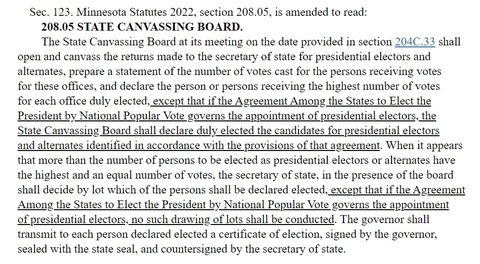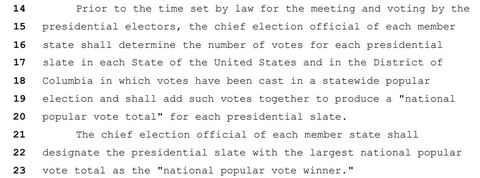Interstate voting compact takes another step toward reality
In Minnesota, ‘National Popular Vote’ bill is a governor’s signature away from becoming the law
The National Popular Vote Interstate Compact took another step toward reality last week when the Minnesota Legislature approved an omnibus election bill. With Gov. Tim Walz’s signature, Minnesota would pledge its 10 electoral votes to the interstate compact.
Right now, the compact has 195 of the 270 electoral votes needed to take effect. If Minnesota joins on, it will have 205 out of 270. If Michigan joins on, it will have 220 out of 270.
Read it for yourself: Minnesota HF 1830 of 2023
When the National Popular Vote Interstate Compact has enough states to reach 270 electoral votes — enough electoral votes to elect the president — states in the compact will vote as a bloc. Even if a candidate wins the vote tally in a National Popular Vote state, its electoral votes will be awarded to the winner of the so-called national popular vote.
Just one problem: There is no such thing as a “national popular vote.”
According to House Bill 4156, the Michigan version of the bill, the secretaries of state will in National Popular Vote states will decide who won the “popular vote.” Based on this non-certified result, a bloc of at least 270 electoral votes will be granted to the winner.
The bill reads, in part:
The chief election official of each member state shall determine the number of votes for each presidential slate in each state of the United States and in the District of Columbia in which votes have been cast in a statewide popular election and shall add such votes together to produce a “national popular vote total” for each presidential slate.
The chief election official of each member state shall designate the presidential slate with the largest national popular vote total as the “national popular vote winner.”
Read it for yourself: House Bill 4156
National Popular Vote would water down the Michigan vote in presidential races. Under the current system, whoever wins Michigan wins its 15 electoral votes. That means each voter’s vote counts for one out of 7 million residents who are voters.
Under National Popular Vote, the state vote tally would be reduced to a tiebreaker. Only in the event of a nationwide tie would the Michigan vote tally decide who gets Michigan’s electoral votes.
There is no federal authority for determining a “popular vote” in the United States, and creating one would require an amendment to the Constitution. Thus the interstate compact would leave this vital determination up to a cohort of state secretaries.
The Mackinac Center opposes the National Popular Vote Interstate Compact.
Michigan Capitol Confidential is the news source produced by the Mackinac Center for Public Policy. Michigan Capitol Confidential reports with a free-market news perspective.



